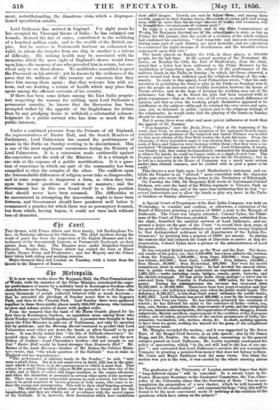Lord Dalhousie has arrived in England. For sight years le
has occupied the Viceregal throne of India ; lie has enlarged our bounds, decreed the fate of states, contributed to the wellbeing of a hundred million souls, and to the wealth of the British em- pire. But he arrives in Portsmouth harbour an exhausted in- valid, to whom the transfer from one ship to another is a labour of difficulty. His sinking health may be associated with the memories which the mere sight of England's shores would force Upon him—the memory of one who preceded him in return, but sur- vived only to see those shores. No multitudes assembled to greet the Proconsul on his arrival; yet he knows by the evidences of the press that the millions of this country are conscious that they have him among them again ; that they welcome him with es- teem, and are desiring a return of health which may 'place him again among the efficient servants of his country.
If there has been some debate among the East India proprie- tors respecting the reasons for settling upon Lord. Dalhousie a permanent annuity, he knows that the discussion has been prompted rather by the appetite of the Englishman for debate than by any grudging desire to withhold a substantial acknow- ledgment to a public servant who has done so much for the public interests.


























 Previous page
Previous page